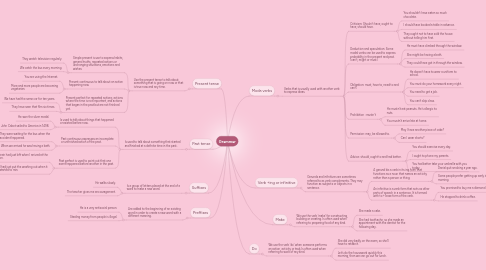
1. Preffixes
1.1. Are added to the beginning of an existing word in order to create a new word with a different meaning.
1.1.1. He is a very antisocial person.
1.1.2. Stealing money from people is illegal.
2. Present tense
2.1. Use the present tense to talk about something that is going on now or that is true now and any time.
2.1.1. Simple present is use to express habits, general truths, repeated actions or unchanging situations, emotions and wishes:
2.1.1.1. They watch television regularly.
2.1.1.2. We catch the bus every morning.
2.1.2. Present continuous to talk about an action happening now.
2.1.2.1. You are using the Internet.
2.1.2.2. More and more people are becoming vegetarian.
2.1.3. Present perfect for repeated actions, actions where the time is not important, and actions that began in the past but are not finished yet.
2.1.3.1. We have had the same car for ten years.
2.1.3.2. They have seen that film six times.
3. Suffixes
3.1. Is a group of letters placed at the end of a word to make a new word.
3.1.1. He walks slowly.
3.1.2. The teacher gives me encouragement.
4. Past tense
4.1. Is used to talk about something that started and finished at a definite time in the past.
4.1.1. Is used to talk about things that happened or existed before now.
4.1.1.1. He won the silver medal.
4.1.1.2. John Cabot sailed to America in 1498.
4.1.2. Past continuous expresses an incomplete or unfinished action of the past.
4.1.2.1. They were waiting for the bus when the accident happened.
4.1.2.2. When we arrived he was having a bath.
4.1.3. Past perfect is used to point out that one event happened before another in the past.
4.1.3.1. The train had just left when I arrived at the station.
4.1.3.2. I had just put the washing out when it started to rain.
5. Verb +ing or infinitive
5.1. Gerunds and infinitives are sometimes referred to as verb complements. They may function as subjects or objects in a sentence.
5.1.1. A gerund bis a verb in its ing form that functions as a noun that names an activity rather than a person or thing.
5.1.1.1. Daniel quit smoking a year ago.
5.1.1.2. Some people prefer getting up early in the morning.
5.1.2. An infinitive is a verb form that acts as other parts of speech in a sentence. It is formed with to + base form of the verb.
5.1.2.1. You promised to buy me a diamond ring.
5.1.2.2. He stopped to drink coffee.
6. Make
6.1. We use the verb 'make' for constructing, building or creating. Is often used when referring to preparing food of any kind.
6.1.1. She made a cake.
6.1.2. She had toothache, so she made an appointment with the dentist for the following day.
7. Moda verbs
7.1. Verbs that is usually used with another verb to express ideas.
7.1.1. Criticism: Shouln't have, ought to have, should have.
7.1.1.1. You shouldn't have eaten so much chocolate.
7.1.1.2. I should have booked a table in advance.
7.1.1.3. They ought not to have sold the house without telling him first.
7.1.2. Deduction and speculation: Some modal verbs can be used to express probability in the present and past. (can't, might or must)
7.1.2.1. He must have climbed through the window.
7.1.2.2. She might be having a bath.
7.1.2.3. They could have got in through the window.
7.1.3. Obligation: must, have to, need to and can't.
7.1.3.1. He doesn't have to wear a uniform to school.
7.1.3.2. You must do your homework every night.
7.1.3.3. You need to get a job.
7.1.3.4. You can't skip class.
7.1.4. Prohibition : mustn't
7.1.4.1. He mustn't eat peanuts. He's allergic to nuts.
7.1.4.2. You mustn't arrive late at home.
7.1.5. Permission: may, be allowed to.
7.1.5.1. May I have another piece of cake?
7.1.5.2. Can I wear shorts?
7.1.6. Advice: should, ought to and had better.
7.1.6.1. You should exercise every day.
7.1.6.2. I ought to phone my parents.
7.1.6.3. You had better take your umbrella with you today.
8. Do
8.1. We use the verb 'do' when someone performs an action, activity or task. Is often used when referring to work of any kind.
8.1.1. She did very badly on the exam, so she'll have to retake it.
8.1.2. Let's do the housework quickly this morning, then we can go out for lunch.
